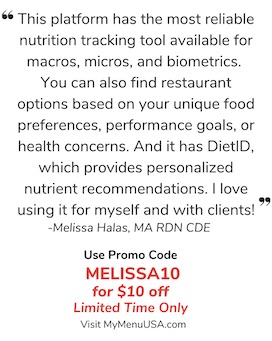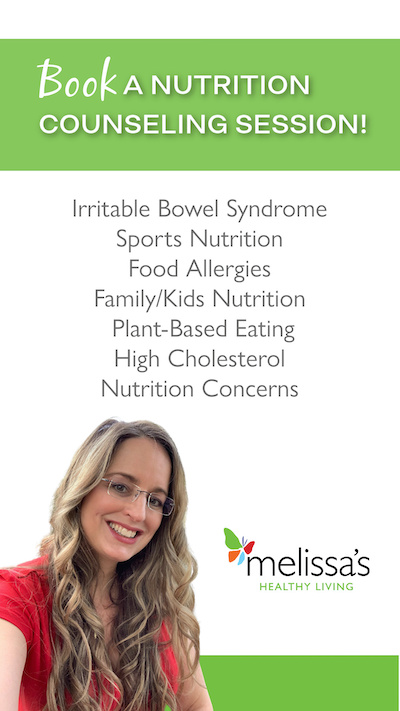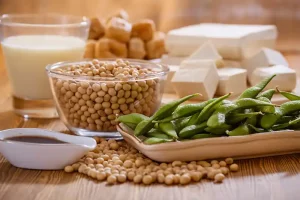
Is soy bad for you? Is it good for you? Does eating soy increase estrogen and lower testosterone levels? Lay your concerns to rest, learn fact from fiction, and feel confident about how to include soy in your healthy lifestyle.
People have SO much to say about soy. As a registered dietitian, I’ve heard it all! But my job is to help bring science to life for better health while busting common food myths. With plant-based meals being the latest (yet greatest) trend, soy may seem like an up-and-coming star. But it’s been a staple in many plant-forward diets for decades.
Over the years, my clients have had their concerns. Will soy impact my testosterone? Will it cause breast cancer? Should I avoid eating soy? But before we spill the soybeans, it’s time to review the basics. Here’s what you need to know about soy and whether soy is bad for men or women.
What is Soy?
First things first, what is soy? Soy products are made from soybeans, which originate from East Asia. They are a nutrient-dense protein containing all nine essential amino acids, making soy a “complete protein.” They also provide ample antioxidants, fiber, phytonutrients, and some omega-3 fatty acids. (1)
Soy and Estrogen – What’s the Link?
A confusing topic with a simple answer! More than any other food, soy has the largest concentration of isoflavones, a class of phytoestrogens. (2) To clarify, phytoestrogens are plant compounds that act like the hormone estrogen, but they are not hormones. (1) In other words, phytoestrogens from soy and estrogen produced by the body are not the same game.
While they may sound similar, they differ in both function and binding sites. (3)
Is Soy Bad for Men?

Boys, it’s time to embrace the soy! No, soy is not bad for men. Stop the stigma—your manhood is safe! So, if you are worried about keeping your bits and pieces healthy, avoiding soy is not the answer.
Does Soy Lower Testosterone Levels?
No. Did you hear that, gents? While some animal research shows conflicting results, human studies found that the isoflavones from soy do not impact testosterone levels. (4,5) Remember, humans and animals don’t metabolize nutrients the same way. While rodents may experience erectile dysfunction (ED) when given a substantially high soy diet, these results were not observed in humans. In fact, soy has been shown to lower total cholesterol and LDL, both known risk factors for heart disease. And ED can indicate endothelial dysfunction, which is a sign of impaired blood flow to the heart and penis, which contributes to the development of atherosclerosis.
To emphasize, men’s sperm concentration, count, and semen quality were not negatively altered by soy consumption. (4) In fact, the phytonutrients in soy can lower risks of Erectile Dysfunction (ED) and are one of the best foods for the prevention of ED!
Does Soy Increase Estrogen in Men?
Yet another nutritional myth that needs debunking! Soy does not increase estrogen, causing men to get enlarged breasts. Plain and simple. Research shows that men’s estrogen levels are not affected by the phytoestrogens in soy—even when eaten in large amounts. (4,5)
Fun Fact!
Men who resistance train and either consume whey or soy protein supplements when matched for leucine content, such as protein powder, show similar results of increased muscle mass and strength. (22,23)
Is Prostate Cancer a Risk from Soy Intake?
Prostate cancer is currently the world’s second most diagnosed cancer for men. But, no need to point the finger at soy! While it was proposed that isoflavones in soy may accumulate in prostatic tissue, this poses no additional risk of prostate cancer. (6,7) In fact, research shows an inverse relationship between isoflavone intake and prostate-specific antigen (PSA) levels. (5,6,7) So, including more soy in your diet may help inhibit the development of prostate cancer. Say hello to edamame as an appetizer!
Is Soy Bad for Women?
While on the myth-busting train, you may have also heard that phytoestrogens from soy are harmful to women, causing an increase in developing breast cancer and maternal health risks. However, soy may actually help prevent cancer and is safe for pregnant mothers. That’s right; another victory for soy!
Is Breast Cancer Linked to Soy?
While elevated estrogen levels may increase the likelihood of breast cancer, phytoestrogens from soy may block the action of one’s own estrogen. (8) Including soy could reduce the risk of breast cancer because it may block your estrogen, which can stimulate the growth and multiplication of cancer cells. (3)
Soy isoflavones may help suppress cell growth, taking on preventative measures against new and recurring growth of cancer cells. (3) Currently, there is some research, although limited evidence, that soy may decrease the risk of death in breast cancer survivors. However, soy is a good dietary fiber source, decreasing the risk of colorectal cancer, weight gain, overweight, and obesity. So for these reasons alone, soy can be part of a healthy diet!
Did You Know…
The top four most reputable cancer organizations all agree that soy is safe for women with previous breast cancer: (9)
- The American Institute for Cancer Research
- The American Cancer Society
- The World Cancer Research Fund International
- The Canadian Cancer Society
Will Eating Soy Disrupt Menstrual Cycles?
While animal research proposes that soy may disrupt menstrual cycles and ovulation, our bodies don’t work the same way! Research done in humans shows that consuming soy isoflavones may actually lengthen menstruation but does not negatively impact ovulatory hormones. (10).
There is also supporting evidence that soy isoflavones are neither harmful to reproductive hormones nor a cause of thyroid problems. (9,10) However, soy can interact with thyroid hormone medication, slightly raising TSH, but the clinical significance is debated. It can still be safely enjoyed with meal timing considerations. Foods like walnuts, cottonseed meal, and dietary fiber may also decrease absorption, so taking medication an hour before eating is recommended.
Fun Fact!
Soy is Mother Nature’s remedy for hot flashes—a common symptom of menopause. (10) In fact, consuming at least ½ cup of cooked soybeans or 20-60 grams per day of soy protein can decrease hot flashes and night sweats. (9) See the soy protein chart below for more guidance.
Soy and Pregnancy – Are There Risks?
Moms will do almost anything to protect the health of their little ones—starting from the womb. However, misinformation abounds surrounding soy intake and fetal health, often causing women to avoid its consumption. As a dietitian counseling expectant mothers, I’ve heard many times, “My husband says I shouldn’t eat soy since we’re having a boy.”
However, soy intake may help increase the thickness of the endometrium or the membrane of the uterus, resulting in higher pregnancy rates. (10) Plus, greater soy consumption is also positively associated with the number of live births. (10) It’s even shown to support healthier pregnancies and lower the risks of birth defects. (9,10)
These benefits may be because people who include soy could be more likely to eat a diet rich in plant-based foods. As always with pregnancy, nutrition balance is key. Work with a dietitian to ensure you’re getting what you need and avoiding over or undernutrition. Book an appointment with me to help optimize your pregnancy nutrition for the best health outcomes.
How Soy Can Benefit Bone Health?
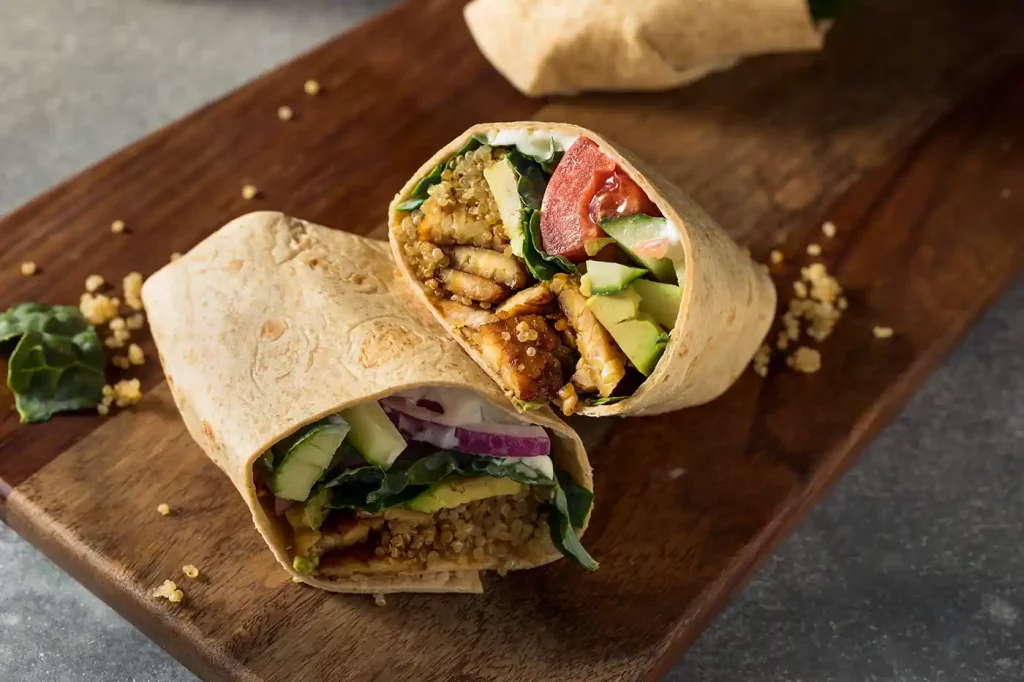
Bone mineral density is a major concern—especially for women. The combination of isoflavones in soy proteins and its other ingredients may positively impact bone health, leading to decreased density loss. (11) Isoflavones stimulate certain genes to produce more collagen and bone proteins, allowing for greater bone formation. (11) In addition, some soy products like tofu and soy milk can offer vitamin D and calcium fortification, contributing to a boost in these bone supporting nutrients.
Improved Biomarkers with Soy Intake
Increasing soy consumption may positively impact biomarkers that stimulate bone growth, remodeling, and resorption, but research is ongoing. (12) One of these biomarkers is IGF-1 (insulin-like growth hormone), which has been shown to stimulate collagen synthesis and the placement and structural integrities inside the cell.
However, this biomarker decreases with age—especially in women who have reached menopause. A decrease in bone mineral density may result in higher incidents of falling, ultimately increasing the risk of bone fractures. So, increasing soy consumption is a natural way to improve the level of IGF-1, helping to better bone resorption, formation, and remodeling. (11)
What Research Shows About Eating Soy for Bone Health
- It was found that postmenopausal women who ate soy more frequently had the lowest risk of bone fractures than those who did not.
- Increased soy intake had positive indications on bone mineral density preservation after menopause. (23)
- Women between the ages of 20 and 26 who ate about ¼ cup of soybeans and 8 mg of isoflavones per day (¼ cup soybeans = 8 mg of isoflavones) for two years developed better density and strength of bones.(11)
How Soy Can Benefit Heart Health and Reduce Risk of Heart Disease
Let’s talk about health trends! People in Asia have a lower risk of developing heart disease yet have significantly greater soy consumption than other areas worldwide. (13)
Heart disease is multi-faceted and may be influenced by other lifestyle factors, such as saturated fat consumption, sugar intake, lack of whole grains, and inadequate exercise. Diets high in animal fat may increase the risk of hypercholesterolemia, hyperlipidemia, and hypertension, all comorbidities that increase the risk of heart disease.
But being plant-forward doesn’t have to be a missed-steak. It’s all about finding a balance that works for your lifestyle. So, start with one daily or weekly plant-based substitution and work your way up!
Learn more about how to incorporate soy as a Vegan Protein Sources.
What the Research Shows About Eating Tofu and Heart Health
- A research study found that people who consumed at least one serving of tofu a week had a lower association of developing coronary heart disease compared to those who have one serving of soy per month. (13)
- According to the American Institute of Cancer Research, daily consumption of soy-based food may lower ‘bad’ cholesterol by 4% to 6% and may reduce blood pressure in those with hypertension. (3)
- A study published in the Journal Circulation reviewed data from 200,000, which was associated with a 18% lower risk of developing heart disease by those who ate at least one serving of tofu a week compared to those who ate even less. (14)
Regular soy intake may help reduce chronic inflammation, cholesterol, and reduce overall disease risk! (13,14)
How Much Soy is Safe to Eat? How Much is Too Much?
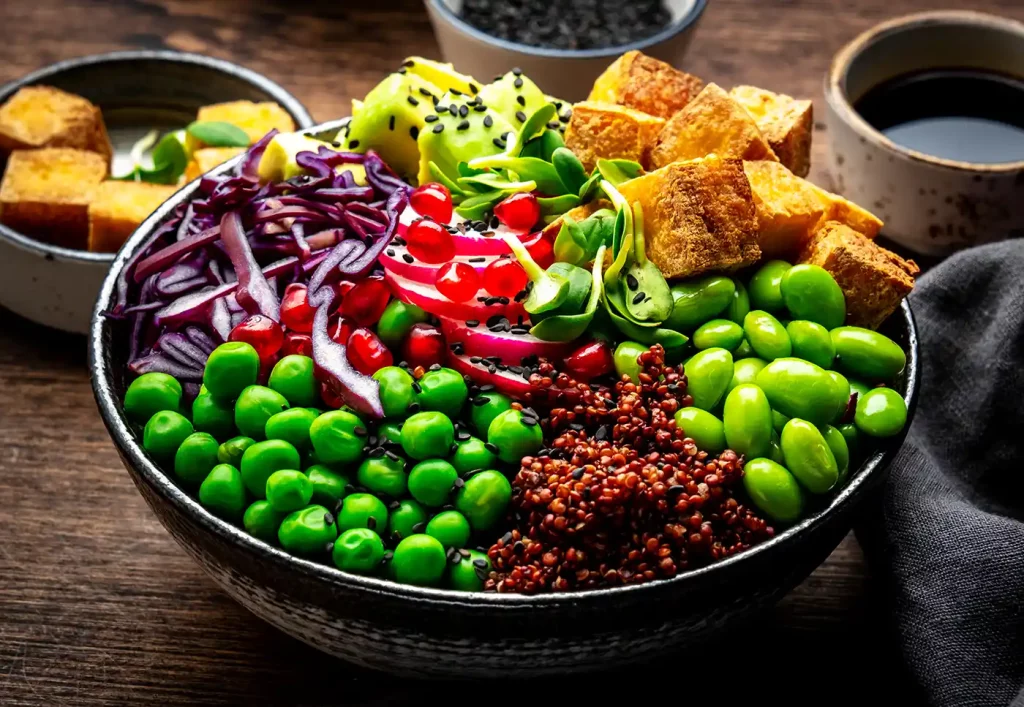
So, with all of these considerations, how much should you eat? The current recommendation for soy protein is at least 25 grams per day with 40 to 80 milligrams of isoflavones. (16)
Let’s break it down to simplify the math! (read the food labels, as protein content can vary)
- 4-ounce serving of firm tofu provides 29mg of isoflavones and 12 grams of soy protein
- 1 cup soy milk provides 11 mg isoflavones and 7 grams of soy protein
- ⅓ cup edamame provides 8 mg of isoflavones and 6 grams of protein
=48 mg of isoflavones and 25 grams of protein (24)
Bone Health Recommendations
While 80mg of isoflavones is typically recommended, your bones may benefit from an even greater intake—upwards of 90mg. (12) But you don’t need that much for other health benefits, so just add it in to your diet. Fortified soy can also help you meet your vitamin D and calcium needs.
Heart Health Recommendations
- According to the U.S. Food and Drug Administration, consuming at least 25g of soy protein per day may help reduce total cholesterol by up to 12%, ultimately lowering cardiovascular-related disease risk. (11,17)
- Specifically, LDL cholesterol (the bad kind) may get reduced by 4% to 8% with a daily intake of 25 to 50g of soy protein. (13) It may also help decrease the risk of type 2 diabetes and certain types of cancer. (18)
How Much Soy Protein Is in These Popular Soy Foods? (19)
| Soy Food | Serving Size | Soy Protein (grams) |
| Pressed or Firm Tofu | 3 oz | 6 to 13 |
| Silken Tofu | 3 oz | 6 |
| Tempeh | 4 oz | 16 to 22 |
| Plain Soy Milk | 8 oz | 3 to 10 |
| Edamame | 3 oz | 8 |
| Canned White Beans | 4 oz | 13 |
| Canned Black Soybeans | 4 oz | 11 |
| Soy Burger | 1 patty | 10 |
| Soy Nuts | 1 oz | 12 |
| Soy Nut Butter | 2 Tbsp | 6 to 8 |
Need More Help Making Healthy Diet Choices?
Need a helping hand to embark on your journey to a more plant-forward lifestyle? Book a call with me today to take the first step towards being your best self! In the meantime, try our tasty recipes, such this Ginger Honey Tofu or Tofu Sloppy Joes for a delicious soy-based meal!
References Reviewed
- Department of Health & Human Services. (2003, March 27). Soybeans and soy foods. Better Health Channel. https://www.betterhealth.vic.gov.au/health/healthyliving/soybeans
- S;, C. C. (n.d.). Soy, phytoestrogens and metabolism: A Review. Molecular and cellular endocrinology. https://pubmed.ncbi.nlm.nih.gov/19433245/
- Collins, K. (2022, January 25). Soy and cancer: Myths and misconceptions. American Institute for Cancer Research. https://www.aicr.org/resources/blog/soy-and-cancer-myths-and-misconceptions/
- Reed, K. E., Camargo, J., Hamilton-Reeves, J., Kurzer, M., & Messins, M. (2020, December 28). Neither soy nor isoflavone intake affects male reproductive hormones: An expanded and updated meta-analysis of Clinical Studies. Reproductive Toxicology. https://www.sciencedirect.com/science/article/pii/S0890623820302926?via%3Dihub#bib0240
- Messina, M. (2010, April 8). Soybean isoflavone exposure does not have feminizing effects on men: A critical examination of the clinical evidence. Fertility and Sterility. https://www.sciencedirect.com/science/article/pii/S0015028210003687
- Applegate, C. C., Rowles, J. L., Ranard, K. M., Jeon, S., & Erdman, J. W. (2018, January 4). Soy consumption and the risk of prostate cancer: An updated systematic review and meta-analysis. Nutrients. https://www.ncbi.nlm.nih.gov/pmc/articles/PMC5793268/
- Hussain M, Banerjee M, Sarkar FH, et al. Soy isoflavones in the treatment of prostate cancer. Nutr Cancer. 2003;47(2):111-117. doi:10.1207/s15327914nc4702_1
- Katherine Zeratsky, R. D. (2022, December 7). Truths and myths about the soy-breast cancer link. Mayo Clinic. https://www.mayoclinic.org/healthy-lifestyle/nutrition-and-healthy-eating/expert-answers/soy-breast-cancer-risk/faq-20120377
- Faure ED, Chantre P, Mares P. Effects of a standardized soy extract on hot flushes: a multicenter, double-blind, randomized, placebo-controlled study. Menopause. 2002;9(5):329-334. doi:10.1097/00042192-200209000-00005Messina, M. (2021, March 27). Full article: Neither Soyfoods nor isoflavones warrant classification … Taylor and Francis Online. https://www.tandfonline.com/doi/full/10.1080/10408398.2021.1895054
- S. George, K., Joseph Muñoz, S. Akhavan, N., M. Foley, E., C. Siebert, S., Gershon Tenenbaum, A. Khalil, D., C. Chai, S., & H. Arjmandi, B. (2019, December 18). Is soy protein effective in reducing cholesterol and improving bone health?. Food & Function. https://pubs.rsc.org/en/content/articlehtml/2020/fo/c9fo01081e
- Lanou, A. J. (2011, December). Soy foods: Are they useful for optimal bone health?. Therapeutic advances in musculoskeletal disease. https://www.ncbi.nlm.nih.gov/pmc/articles/PMC3383497/
- Soy protein and cardiovascular disease | circulation – aha/ASA journals. (n.d.-b). https://www.ahajournals.org/doi/full/10.1161/01.cir.102.20.2555
- Isoflavone intake and the risk of coronary heart disease in US men and … (n.d.-a). https://www.ahajournals.org/doi/10.1161/CIRCULATIONAHA.119.041306
- Ma L, Liu G, Ding M, et al. Isoflavone Intake and the Risk of Coronary Heart Disease in US Men and Women: Results From 3 Prospective Cohort Studies. Circulation. 2020;141(14):1127-1137. doi:10.1161/CIRCULATIONAHA.119.041306
- Michelfelder, A. J. (2009, January 1). Soy: A complete source of protein. American Family Physician. https://www.aafp.org/pubs/afp/issues/2009/0101/p43.html#:~:text=The%20recommended%20intake%20of%20dietary,per%20day%20for%20soy%20isoflavones.
- UCSF Health. (2022, June 24). Soy protein content of foods. ucsfhealth.org. https://www.ucsfhealth.org/education/soy-protein-content-of-foods
- Nguyen, L., Steinberg, F., & Sheri-Zidenberg-Cherr. (2016, January). Nutrition and health info sheet: Soy – UC davis. Nutrition and Health Info Sheet: Soy. https://nutrition.ucdavis.edu/sites/g/files/dgvnsk426/files/content/infosheets/factsheets/fact-pro-soy.pdf
- Better Health Channel. Soybeans. Vic.gov.au. Published 2012. https://www.betterhealth.vic.gov.au/health/healthyliving/soybeans
- Soy Protein Content of Foods. ucsfhealth.org. https://www.ucsfhealth.org/education/soy-protein-content-of-foods
- Ma L, Liu G, Ding M, et al. Isoflavone Intake and the Risk of Coronary Heart Disease in US Men and Women. Circulation. 2020;141(14):1127-1137.
- Lynch HM, Buman MP, Dickinson JM, Ransdell LB, Johnston CS, Wharton CM. No Significant Differences in Muscle Growth and Strength Development When Consuming Soy and Whey Protein Supplements Matched for Leucine Following a 12 Week Resistance Training Program in Men and Women: A Randomized Trial. Int J Environ Res Public Health. 2020;17(11):3871. Published 2020 May 29. doi:10.3390/ijerph17113871
- Li C, Meng H, Wu S, et al. Daily Supplementation With Whey, Soy, or Whey-Soy Blended Protein for 6 Months Maintained Lean Muscle Mass and Physical Performance in Older Adults With Low Lean Mass. J Acad Nutr Diet. 2021;121(6):1035-1048.e6. doi:10.1016/j.jand.2021.01.006
- Ma DF, Qin LQ, Wang PY, Katoh R. Soy isoflavone intake increases bone mineral density in the spine of menopausal women: meta-analysis of randomized controlled trials. Clin Nutr. 2008;27(1):57-64. doi:10.1016/j.clnu.2007.10.012
- https://www.ars.usda.gov/arsuserfiles/80400525/data/isoflav/isoflav_r2.pdf

